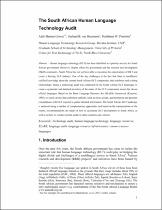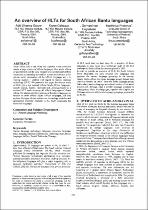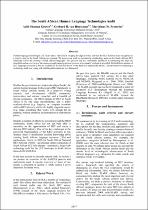JavaScript is disabled for your browser. Some features of this site may not work without it.
- ResearchSpace
- →
- Research Publications/Outputs
- →
- Journal Articles
- →
- View Item
| dc.contributor.author |
Grover, AS

|
|
| dc.contributor.author |
Van Huyssteen, GB

|
|
| dc.contributor.author |
Pretorius, MW

|
|
| dc.date.accessioned | 2011-09-22T08:04:34Z | |
| dc.date.available | 2011-09-22T08:04:34Z | |
| dc.date.issued | 2011-06 | |
| dc.identifier.citation | Grover, AS, Van Huyssteen, GB, and Pretorius, MW. 2011. South African human language technology audit. Language Resources and Evaluation, Vol. 45, pp. 271-288 | en_US |
| dc.identifier.issn | 1574-020X | |
| dc.identifier.uri | http://www.meraka.org.za/pubs/Sharma10technologies.pdf | |
| dc.identifier.uri | http://hdl.handle.net/10204/5154 | |
| dc.description | Copyright: 2011 Springer. This is a pre print version of the work. The definitive version is published in Language Resources and Evaluation, Vol. 45, pp. 271-288 | en_US |
| dc.description.abstract | Human language technology (HLT) has been identified as a priority area by the South African government. However, despite efforts by government and the research and development (R&D) community, South Africa has not yet been able to maximise the opportunities of HLT and create a thriving HLT industry. One of the key challenges is the fact that there is insufficient codified knowledge about the current South African HLT components, their attributes and existing relationships. Hence a technology audit was conducted for the South African HLT landscape, to create a systematic and detailed inventory of the status of the HLT components across the eleven official languages. Based on the Basic Language Resource Kit (BLaRK) framework (Krauwer, 1998), we used various data collection methods (such as focus groups, questionnaires and personal consultations with HLT experts) to gather detailed information. The South African HLT landscape is analysed using a number of complementary approaches and based on the interpretations of the results, recommendations are made on how to accelerate HLT development in South Africa, as well as on how to conduct similar audits in other countries and contexts. | en_US |
| dc.language.iso | en | en_US |
| dc.publisher | Springer Publisher | en_US |
| dc.relation.ispartofseries | Workflow;7040 | |
| dc.subject | Technology audit | en_US |
| dc.subject | Human language technology | en_US |
| dc.subject | Language resources | en_US |
| dc.subject | BLaRK | en_US |
| dc.subject | Language audit | en_US |
| dc.subject | Language resource infrastructure | en_US |
| dc.subject | Resource-scarce languages | en_US |
| dc.title | South African human language technology audit | en_US |
| dc.type | Article | en_US |
| dc.identifier.apacitation | Grover, A., Van Huyssteen, G., & Pretorius, M. (2011). South African human language technology audit. http://hdl.handle.net/10204/5154 | en_ZA |
| dc.identifier.chicagocitation | Grover, AS, GB Van Huyssteen, and MW Pretorius "South African human language technology audit." (2011) http://hdl.handle.net/10204/5154 | en_ZA |
| dc.identifier.vancouvercitation | Grover A, Van Huyssteen G, Pretorius M. South African human language technology audit. 2011; http://hdl.handle.net/10204/5154. | en_ZA |
| dc.identifier.ris | TY - Article AU - Grover, AS AU - Van Huyssteen, GB AU - Pretorius, MW AB - Human language technology (HLT) has been identified as a priority area by the South African government. However, despite efforts by government and the research and development (R&D) community, South Africa has not yet been able to maximise the opportunities of HLT and create a thriving HLT industry. One of the key challenges is the fact that there is insufficient codified knowledge about the current South African HLT components, their attributes and existing relationships. Hence a technology audit was conducted for the South African HLT landscape, to create a systematic and detailed inventory of the status of the HLT components across the eleven official languages. Based on the Basic Language Resource Kit (BLaRK) framework (Krauwer, 1998), we used various data collection methods (such as focus groups, questionnaires and personal consultations with HLT experts) to gather detailed information. The South African HLT landscape is analysed using a number of complementary approaches and based on the interpretations of the results, recommendations are made on how to accelerate HLT development in South Africa, as well as on how to conduct similar audits in other countries and contexts. DA - 2011-06 DB - ResearchSpace DP - CSIR KW - Technology audit KW - Human language technology KW - Language resources KW - BLaRK KW - Language audit KW - Language resource infrastructure KW - Resource-scarce languages LK - https://researchspace.csir.co.za PY - 2011 SM - 1574-020X T1 - South African human language technology audit TI - South African human language technology audit UR - http://hdl.handle.net/10204/5154 ER - | en_ZA |









